Week #96 | August 3rd-August 9 ,2025
Account of the main events in the Israel-Hamas war and hostilities by the Iranian Axis
This is a product by IDSF-Habithonistim’s Research Department | August 11th, 2025
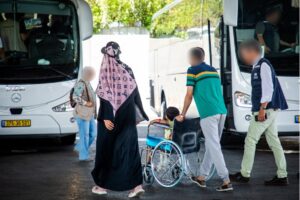
160 children left Gaza for medical treatment with caregivers, through Kerem Shalom Crossing to the Allenby Bridge Crossing for treatment in Jordan and to the EU. | Source: COGAT on X
Overview
- Senior Hamas figure Husam Badran told Al Jazeera that “the weapon of resistance is non-negotiable”, framing it as belonging to all Palestinian factions. He stated that full Palestinian sovereignty would integrate the armed “resistance” into the state military.
- Israel’s Security Cabinet decided to take over Hamas’ last stronghold. It approved a comprehensive offensive to evacuate Gaza City’s population, relocate civilians to designated humanitarian centers in the central Strip, capture and destroy the city, and—with U.S. funding—expand aid distribution points from four to sixteen to completely sever Hamas’s distribution capabilities.
- The government approved a plan giving Palestinians until October 7, 2025 — the second anniversary of Hamas’s October 7, 2023 attack — to evacuate Gaza City
- Chancellor Friedrich Merz announced Berlin will halt military exports to Israel for use in Gaza, citing humanitarian concerns.
- S. Ambassador Mike Huckabee said GHF aid sites will operate 24/7 as the operation “scales up,” funded by $1 billion in U.S. and international donations.
- Israel signed the largest gas export deal in its history — a $35 billion agreement to supply natural gas from the Leviathan field to Egypt. The gas will be used domestically in Egypt and re-exported via Egyptian LNG terminals.
- The Lebanese government unanimously approved Hezbollah disarmament—after Hezbollah ministers left the session. The Lebanese Army must present an implementation plan by the end of August and collect all weapons by the end of 2025.
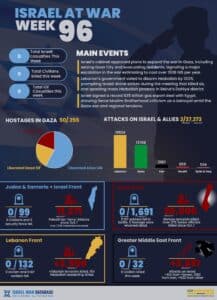
Gaza
Hostage Deal
- Abu Obeida, Hamas’s military spokesperson, claimed willingness to cooperate with the Red Cross to deliver food and medical aid to hostages—only if humanitarian corridors are opened for all Gazans and air drops are halted. He asserted that hostages receive the same rations as their captors and other residents.
- Political bureau member Izzat al-Risheq insisted Hamas treats hostages “fairly” and placed responsibility for their condition solely on Israel and the “siege.” He accused Israel’s failure to locate them of leading to harm.
- Senior Hamas figure Husam Badran told Al Jazeera that “the weapon of resistance is non-negotiable”, framing it as belonging to all Palestinian factions. He stated that full Palestinian sovereignty would integrate the armed “resistance” into the state military, “The weapon of resistance is non-negotiable. It belongs not just to Hamas, but to all Palestinian factions and the Palestinian people. Give us a fully sovereign state, and the resistance’s weapons will be part of its army”.
Israeli Cabinet Decision – Take over last Hamas Stronghold
- Persistent Hamas refusal to engage in a hostage deal triggered intense debate between political and military leadership. The IDF Chief of Staff preferred targeted operations to limit risk to hostages and reduce combat fatigue, whereas the Prime Minister pushed for a full-scale maneuver to capture Gaza City.
- On Thursday evening, the Security Cabinet decided in favor of a comprehensive offensive to evacuate Gaza City’s population, relocate civilians to designated humanitarian centers in the central Strip, capture and destroy the city, and—with U.S. funding—expand aid distribution points from four to sixteen to completely sever Hamas’s distribution capabilities.
The plan aims to demilitarize the Strip, defeat Hamas, and establish a non-Hamas, non-Palestinian Authority local government under Israeli security oversight.
- Cabinet’s Five Principles for Ending the War
- Complete disarmament of Hamas.
- Return of all 50 remaining hostages (20 believed alive).
- Demilitarization of Gaza.
- Israeli security control over the Strip.
- Establishment of a civilian government that is neither Hamas nor the Palestinian Authority.
- After a 10-hour Security Cabinet meeting, the government approved a plan giving Palestinians until October 7, 2025 — the second anniversary of Hamas’s October 7, 2023 attack — to evacuate Gaza City
- After this two-month window, the IDF will launch a ground offensive into Gaza City, impose a full siege, and target all remaining Hamas operatives. Once secured, forces will advance to remaining unconquered areas of Gaza.
- Israel currently controls 75% of the Strip. The remaining 25%, mostly Gaza City and refugee camps in central Gaza, has been avoided due to intelligence assessments that most hostages are held there. Nearly all of Gaza’s 2 million residents are concentrated in this area.
- The military opposed the cabinet’s plans with IDF Chief of Staff Lt. Gen. Eyal Zamir’s Objections being:
- Warned the plan risks hostages’ lives and will require reserve manpower the IDF cannot spare.
- Estimated 1–2 years for full occupation, with five months of intense combat in the initial phase.
- Cautioned that Israel could become responsible for civil administration and services for all of Gaza – shifting from the current stance that the UN and aid agencies are responsible.
- Told cabinet ministers they might as well remove the hostage recovery goal from war aims, calling the plan a “death trap” for IDF soldiers.
- Despite opposition, Zamir pledged to prepare detailed operational plans and execute them “in the best possible way” if ordered.
- Major Israeli media outlets echoed security establishment concerns, highlighting deep divisions between military and political leadership. According to Kan public broadcaster, Zamir told ministers: “You might as well formally remove the goal of returning the captives from Israel’s official war aims. This plan is sending IDF soldiers into a death trap.”
- Under heavy international pressure, the Prime Minister clarified that Israel does not seek permanent occupation, but rather the removal of Hamas to enable new governance supported by international partners.
International Reactions to Israel’s Cabinet’s Decision
- S. President Donald Trump: “That’s pretty much going to be up to Israel.”
- UN Secretary-General António Guterres: “A dangerous escalation that risks deepening the already catastrophic consequences for millions of Palestinians.”
- European Council President António Costa: “Such a decision must have consequences for EU–Israel ties. The situation in Gaza remains dramatic, and the decision by the Israeli government will only further worsen it.”
- Dutch FM Caspar Veldkamp: “Netanyahu’s cabinet is losing Europe – totally. We stand with Israel, but not with the policy of the Israeli government.”
- UK PM Keir Starmer: “This action will do nothing to bring an end to this conflict or to help secure the release of the hostages. It will only bring more bloodshed.”
- German Chancellor Friedrich Merz: “It is increasingly difficult to understand how the Israeli military plan would help achieve legitimate aims.”
- Joint Statement – FMs of Australia, Germany, Italy, New Zealand, UK: “The plans that the Government of Israel has announced risk violating international humanitarian law.”
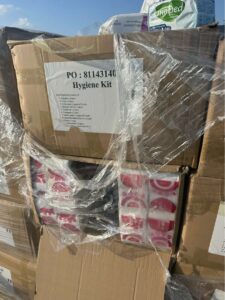
Nearly 2,500 tons of hygiene kits and products have entered Gaza| Source: COGAT on X
Operational
- In coordination with the elite Yahalom combat engineering unit, IDF forces discovered and destroyed a 2 km network of underground tunnels.
- The 401st Armored Brigade shifted its main operational focus to the Daraj-Tuffah area, where it has eliminated dozens of militants. In cooperation with Yahalom, they uncovered and demolished another 1 km-long underground route, removing a significant component of Hamas’s subterranean operational capacity.
Humanitarian-Aid Expansion
- The humanitarian airdrop campaign expanded this week with Belgium joining on Sunday and Canada on Monday, bringing the total number of participating countries to six. By Tuesday, a cumulative 785 aid packages had been dropped; Wednesday saw an additional 107 packages, and Thursday another 80.
- On August 5, Fox News aired footage from GHF distribution points as Israel and the U.S. lobbied for full international backing to halt truck deliveries in favor of controlled distribution points. Recent increases of up to 200 trucks per day entering the Strip have caused food prices to fall again.
- According to COGAT, close to 1900 trucks were collected and distributed this week from the Gazan side of the Kerem Shalom and Zikim Crossings. Over 1310 humanitarian aid trucks, primarily containing food, entered through the crossings this week.
- Australia announced an additional 20 million AUD in humanitarian aid for Gaza residents, following the establishment of new humanitarian corridors. The package includes food, medical supplies, and life-saving services for women and children, bringing total Australian aid since October 7, 2023, to over 130 million AUD.
- S. Ambassador Mike Huckabee said GHF aid sites will operate 24/7 as the operation “scales up,” funded by $1 billion in U.S. and international donations. President Trump said regarding the war in Gaza: “My primary focus is feeding Gazans who are obviously not doing too well with the food. Israel is going to help us with that in terms of distribution and also money. Arab states are also going to help us with that in terms of money and possibly distribution.”
- For the first time in almost a year, Israel will allow private-sector imports into Gaza, with COGAT saying the goal is to “increase the volume of aid entering the Gaza Strip, while reducing reliance on aid collection by the United Nations and international organizations.”
- UN figures show that 88% of aid trucks since May were looted before reaching intended destinations — 2,309 out of 2,604 trucks.
Domestic Israel
- Arab media reported that Israel signed the largest gas export deal in its history — a $35 billion agreement to supply natural gas from the Leviathan field to Egypt. The gas will be used domestically in Egypt and re-exported via Egyptian LNG terminals, potentially reaching countries without diplomatic ties to Israel. This move is expected to strengthen regional energy stability.
- The first ultra-Orthodox IDF company (~50 soldiers) completed 7 months of basic training. The IDF says 80,000 eligible Haredi men between ages 18-24 are eligible to enlist, with at least 12,000 needed to fill urgent manpower needs.
Judea and Samaria
- In a two-day operation from Monday night to Tuesday morning, IDF paratrooper reconnaissance units and Border Police conducted a brigade-level raid in Barta’a, searching 50 structures, arresting several suspects, and seizing weapons and hundreds of thousands of shekels in terror funds.
- The U.S. has requested that Israel investigate the death of Palestinian-American Khamis Ayyad, reportedly from smoke inhalation while attempting to extinguish a fire allegedly set by settlers.
Lebanon
Diplomatic
- In a high-tension week ahead of a parliamentary vote, large pro-Hezbollah rallies were held in Beirut protesting against Hezbollah disarmament, while Sunnis, Christians, and Druze support disarmament .
- Christian Lebanese Forces leader Samir Geagea argued Hezbollah’s weapons bring only “damage and destruction”, stressing that the group no longer deters Israel and that 70–75% of Lebanese oppose Hezbollah’s path.
- Hezbollah Deputy Secretary-General Naim Qassem countered that Israel must first withdraw from five positions, release all prisoners, and stop attacks before disarmament could be discussed, claiming the group has suffered 5,000 dead and 13,000 wounded since the war began.
- Ultimately, the Lebanese government unanimously approved disarmament—after Hezbollah ministers left the session. The Lebanese Army must present an implementation plan by the end of August and collect all weapons by the end of 2025.
- During the Lebanese cabinet meeting, Israeli UAVs struck the Bekaa Valley twice, killing six and wounding ten. The Defense Minister pledged to enforce disarmament efforts, despite Hezbollah’s objections.
Operational
- A French UNIFIL unit, operating alongside the Lebanese Army, uncovered a Hezbollah tunnel network containing hundreds of artillery shells, rockets, and other munitions.
- IDF carried out at least five targeted assassinations and destroyed Hezbollah infrastructure in southern Lebanon in the days leading up to the parliamentary vote.
- For the first time, Lebanese military UAVs struck the Bekaa Valley, killing three weapons and drug traffickers linked to Hezbollah.
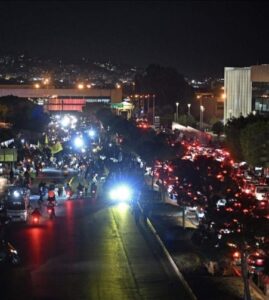
Pro Hezbollah rally in Beirut protesting disarmament| Source: Lebanon and world news on telegram, https://t.me/aytajanoub18
Syria
- In Damascus, Syrian President Ahmed al– Sharaa signed $14 billion worth of investment MOUs with international companies, including $4 billion for Damascus International Airport, $2 billion for a metro system, and $2 billion for Damascus Towers.
- S. Special Envoy Thomas Ba rrack expressed Washington’s interest in developing Damascus as a regional trade hub.
- President al– Sharaa met with Turkish FM Hakan Fidan to discuss trade, transportation, energy, and joint efforts to rebuild Syria. Fidan emphasized security concerns, threats to Syrian sovereignty, and called on the international community to stop Israeli aggression in Syria.
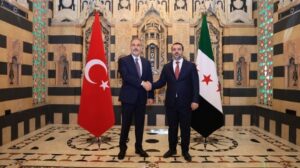
Turkish foreign minister Hakan Fidan meeting his Syrian counterpart in Damascus| Source: Sana news agency on telegram, https://t.me/SANANewsEnglish

President al Sharaa signing new MOUs with a number of international companies | Source: Sana news agency on telegram, https://t.me/SANANewsEnglish
Iran
- Iranian Deputy Foreign Minister Saeed Khatibzadeh warned on China’s Phoenix TV that any U.S. or Israeli attack would “change the equations” and make future negotiations “armed.”
- Kazem Gharibabadi, spokesman for the Iranian parliament’s National Security Committee, said Europeans have no right to trigger the JCPOA snapback mechanism because they have not met their obligations under the nuclear agreement.
International
- Pro-Palestinian activists in Brussels shut down the embassies of Egypt, Germany, and the UK, spray-painting anti-Israel graffiti.
- El Al’s Paris offices were vandalized with the phrase “El Al – the airline of genocide”.
- Chancellor Friedrich Merz announced Berlin will halt military exports to Israel for use in Gaza, citing humanitarian concerns.
- The Times reported that Israel may end intelligence cooperation with the UK if London recognizes a Palestinian state.
- S. Ambassador to Israel Mike Huckabee sharply criticized UK PM Keir Starmer’s ceasefire call, comparing it to aiding Nazi Germany in WWII.
- In Clayton, MO, near St. Louis, three cars were torched in an antisemitic attack, with graffiti reading “Death to the IDF”.
- Secretary of State Marco Rubio said Hamas believes it is “winning” the global PR war and thus refuses concessions, stressing that peace is impossible while Hamas exists.
- Secretary Rubio also reacted to the announcement that France, Canada and the UK plan on recognizing a separate Palestinian by stating, “Talks with Hamas fell apart on the day Macron made the unilateral decision that he’s going to recognize the Palestinian state … So those messages, while largely symbolic in their minds, actually have made it harder to get peace and harder to achieve a deal with Hamas.”
